Creative Writing Workshop—Two in Kota Kinabalu
Just back from two back-to-back workshops in Kota Kinabalu (Sabah, Borneo), one a six-hour workshop for Universiti Malaysia Sabah and then a four-hour workshop organized by the KK Theatre Group, SPArKS.
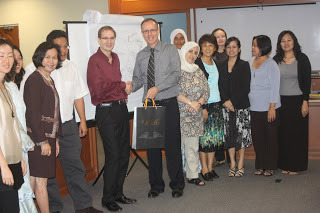 Mark Storey presenting a tired me a gift after 6-hour workshopThe first workshop at UMS, we started out with 30 academic lecturers and tutors, including someone who recognized me from Unimas, a former colleague from USM, and a fellow expat writer, Mark Storey, who organized it.
Mark Storey presenting a tired me a gift after 6-hour workshopThe first workshop at UMS, we started out with 30 academic lecturers and tutors, including someone who recognized me from Unimas, a former colleague from USM, and a fellow expat writer, Mark Storey, who organized it.
In the second workshop, the ages ran from thirteen to mid-sixties, from secondary students to published authors, including fellow MPH writer, Tina Kisil, author of Footprints in the Paddy Field . One participant flew in from Miri, one was the daughter of one of the UMS staff that I taught the previous day, and another, Farida, was the mother of a student I taught at USM years ago. In fact, her enthusiasm for bringing a creative writing workshop to KK brought both UMS (Mark) and SPArKS (Jude) aboard. Suddenly I'm in KK conducting not one but two workshops to two very different groups.
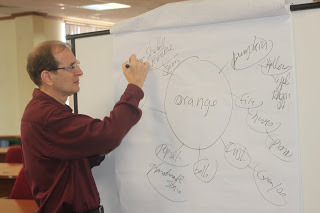 Also attending the second workshop were three UMS students who were taking creative writing in Malay. They told me how different my approach was from the way they were being taught and how easily they can apply my ideas to generate their own ideas. At UMS, they're getting mostly theory but they don't know what to write, or where to even start! I take the opposite approach by leaving the theory where it belongs in the textbooks (see "Tree Methodology" from Tropical Affairs) and showing them some useful pre-writing techniques that actually work in the real world. We also use sensory details and 5-Ws as prompts that flood them with even more ideas. Within minutes they're eager to write. Several times, after getting them started, I had to stop them, so we could move on, so I could introduce more story-starter ideas! The important thing is they got started and later they can finish up what they began.
Also attending the second workshop were three UMS students who were taking creative writing in Malay. They told me how different my approach was from the way they were being taught and how easily they can apply my ideas to generate their own ideas. At UMS, they're getting mostly theory but they don't know what to write, or where to even start! I take the opposite approach by leaving the theory where it belongs in the textbooks (see "Tree Methodology" from Tropical Affairs) and showing them some useful pre-writing techniques that actually work in the real world. We also use sensory details and 5-Ws as prompts that flood them with even more ideas. Within minutes they're eager to write. Several times, after getting them started, I had to stop them, so we could move on, so I could introduce more story-starter ideas! The important thing is they got started and later they can finish up what they began.
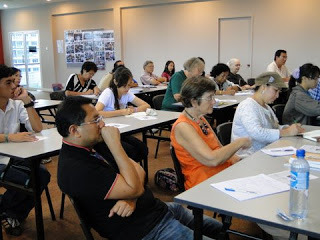 The workshops went so well in fact, it looks like I'll be back in August for another related workshop and possibly a follow up in November. The one in August, I will be creating two longer writing sessions (one for first-person non-fiction, the other for fiction) so they can produce two finished samples to add to what they've already started and hopefully completed. Then a follow-up workshop (after they've had time to rewrite and polish) so I can critique their opening pages from one of those samples, as I did for the 2009 MPH Short Story Awards when I was one of their judges. By limiting the size of the workshop to 20-25, we can devote 10 minutes for each participant.
The workshops went so well in fact, it looks like I'll be back in August for another related workshop and possibly a follow up in November. The one in August, I will be creating two longer writing sessions (one for first-person non-fiction, the other for fiction) so they can produce two finished samples to add to what they've already started and hopefully completed. Then a follow-up workshop (after they've had time to rewrite and polish) so I can critique their opening pages from one of those samples, as I did for the 2009 MPH Short Story Awards when I was one of their judges. By limiting the size of the workshop to 20-25, we can devote 10 minutes for each participant.
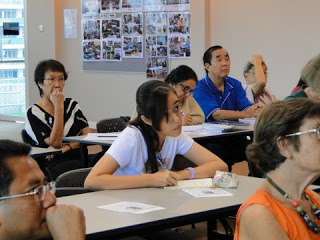 When I did this in Kuching '09, this worked wonderfully. They all benefited no matter whose story we were discussing since the others made similar mistakes in their own stories. (It's easier to find mistakes in someone else's story than your own!) When I tried this in Miri, it wasn't as effective because many of the writers had sent in stories via their friends or even their moms, so they weren't even present for their own feedback! Other writers took advantage of the theater style seating and passed down multiple stories. One submitted four! I was furious when I found out later. It was so unfair to the writers who were present with their own short stories because we couldn't get to them all. This time around, as I did in Kuching, where we all sat around one long table, I will personally collect each story from each writer.
When I did this in Kuching '09, this worked wonderfully. They all benefited no matter whose story we were discussing since the others made similar mistakes in their own stories. (It's easier to find mistakes in someone else's story than your own!) When I tried this in Miri, it wasn't as effective because many of the writers had sent in stories via their friends or even their moms, so they weren't even present for their own feedback! Other writers took advantage of the theater style seating and passed down multiple stories. One submitted four! I was furious when I found out later. It was so unfair to the writers who were present with their own short stories because we couldn't get to them all. This time around, as I did in Kuching, where we all sat around one long table, I will personally collect each story from each writer.
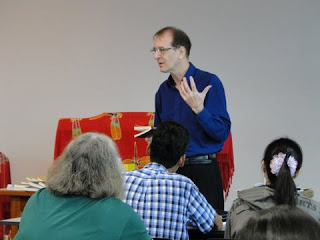 By putting on my judging and editor's hat, I can show them what is holding back their writing (be it grammar, organization, style, including word choices, repetition, tentative or trite expressions), so they, and all those who attend, can take their writing to the next level. Here are the judging tips that I posted for the MPH workshop.
By putting on my judging and editor's hat, I can show them what is holding back their writing (be it grammar, organization, style, including word choices, repetition, tentative or trite expressions), so they, and all those who attend, can take their writing to the next level. Here are the judging tips that I posted for the MPH workshop.
A one-off workshop—although inspiring and motivating for all—is rarely enough. One writer in Kuching, was so inspired by one of my workshops at Unimas, he turned his ideas into five hundred page book! For others, they'll eventually get around to doing some writing. We all know about good intentions, but life and work often gets in the way. The real learning comes from the actual writing. The doing! —Borneo Expat Writer[image error]
 Mark Storey presenting a tired me a gift after 6-hour workshopThe first workshop at UMS, we started out with 30 academic lecturers and tutors, including someone who recognized me from Unimas, a former colleague from USM, and a fellow expat writer, Mark Storey, who organized it.
Mark Storey presenting a tired me a gift after 6-hour workshopThe first workshop at UMS, we started out with 30 academic lecturers and tutors, including someone who recognized me from Unimas, a former colleague from USM, and a fellow expat writer, Mark Storey, who organized it. In the second workshop, the ages ran from thirteen to mid-sixties, from secondary students to published authors, including fellow MPH writer, Tina Kisil, author of Footprints in the Paddy Field . One participant flew in from Miri, one was the daughter of one of the UMS staff that I taught the previous day, and another, Farida, was the mother of a student I taught at USM years ago. In fact, her enthusiasm for bringing a creative writing workshop to KK brought both UMS (Mark) and SPArKS (Jude) aboard. Suddenly I'm in KK conducting not one but two workshops to two very different groups.
 Also attending the second workshop were three UMS students who were taking creative writing in Malay. They told me how different my approach was from the way they were being taught and how easily they can apply my ideas to generate their own ideas. At UMS, they're getting mostly theory but they don't know what to write, or where to even start! I take the opposite approach by leaving the theory where it belongs in the textbooks (see "Tree Methodology" from Tropical Affairs) and showing them some useful pre-writing techniques that actually work in the real world. We also use sensory details and 5-Ws as prompts that flood them with even more ideas. Within minutes they're eager to write. Several times, after getting them started, I had to stop them, so we could move on, so I could introduce more story-starter ideas! The important thing is they got started and later they can finish up what they began.
Also attending the second workshop were three UMS students who were taking creative writing in Malay. They told me how different my approach was from the way they were being taught and how easily they can apply my ideas to generate their own ideas. At UMS, they're getting mostly theory but they don't know what to write, or where to even start! I take the opposite approach by leaving the theory where it belongs in the textbooks (see "Tree Methodology" from Tropical Affairs) and showing them some useful pre-writing techniques that actually work in the real world. We also use sensory details and 5-Ws as prompts that flood them with even more ideas. Within minutes they're eager to write. Several times, after getting them started, I had to stop them, so we could move on, so I could introduce more story-starter ideas! The important thing is they got started and later they can finish up what they began. The workshops went so well in fact, it looks like I'll be back in August for another related workshop and possibly a follow up in November. The one in August, I will be creating two longer writing sessions (one for first-person non-fiction, the other for fiction) so they can produce two finished samples to add to what they've already started and hopefully completed. Then a follow-up workshop (after they've had time to rewrite and polish) so I can critique their opening pages from one of those samples, as I did for the 2009 MPH Short Story Awards when I was one of their judges. By limiting the size of the workshop to 20-25, we can devote 10 minutes for each participant.
The workshops went so well in fact, it looks like I'll be back in August for another related workshop and possibly a follow up in November. The one in August, I will be creating two longer writing sessions (one for first-person non-fiction, the other for fiction) so they can produce two finished samples to add to what they've already started and hopefully completed. Then a follow-up workshop (after they've had time to rewrite and polish) so I can critique their opening pages from one of those samples, as I did for the 2009 MPH Short Story Awards when I was one of their judges. By limiting the size of the workshop to 20-25, we can devote 10 minutes for each participant.  When I did this in Kuching '09, this worked wonderfully. They all benefited no matter whose story we were discussing since the others made similar mistakes in their own stories. (It's easier to find mistakes in someone else's story than your own!) When I tried this in Miri, it wasn't as effective because many of the writers had sent in stories via their friends or even their moms, so they weren't even present for their own feedback! Other writers took advantage of the theater style seating and passed down multiple stories. One submitted four! I was furious when I found out later. It was so unfair to the writers who were present with their own short stories because we couldn't get to them all. This time around, as I did in Kuching, where we all sat around one long table, I will personally collect each story from each writer.
When I did this in Kuching '09, this worked wonderfully. They all benefited no matter whose story we were discussing since the others made similar mistakes in their own stories. (It's easier to find mistakes in someone else's story than your own!) When I tried this in Miri, it wasn't as effective because many of the writers had sent in stories via their friends or even their moms, so they weren't even present for their own feedback! Other writers took advantage of the theater style seating and passed down multiple stories. One submitted four! I was furious when I found out later. It was so unfair to the writers who were present with their own short stories because we couldn't get to them all. This time around, as I did in Kuching, where we all sat around one long table, I will personally collect each story from each writer. By putting on my judging and editor's hat, I can show them what is holding back their writing (be it grammar, organization, style, including word choices, repetition, tentative or trite expressions), so they, and all those who attend, can take their writing to the next level. Here are the judging tips that I posted for the MPH workshop.
By putting on my judging and editor's hat, I can show them what is holding back their writing (be it grammar, organization, style, including word choices, repetition, tentative or trite expressions), so they, and all those who attend, can take their writing to the next level. Here are the judging tips that I posted for the MPH workshop. A one-off workshop—although inspiring and motivating for all—is rarely enough. One writer in Kuching, was so inspired by one of my workshops at Unimas, he turned his ideas into five hundred page book! For others, they'll eventually get around to doing some writing. We all know about good intentions, but life and work often gets in the way. The real learning comes from the actual writing. The doing! —Borneo Expat Writer[image error]
Published on April 12, 2011 05:47
No comments have been added yet.
Robert Raymer's Blog
- Robert Raymer's profile
- 3 followers
Robert Raymer isn't a Goodreads Author
(yet),
but they
do have a blog,
so here are some recent posts imported from
their feed.



